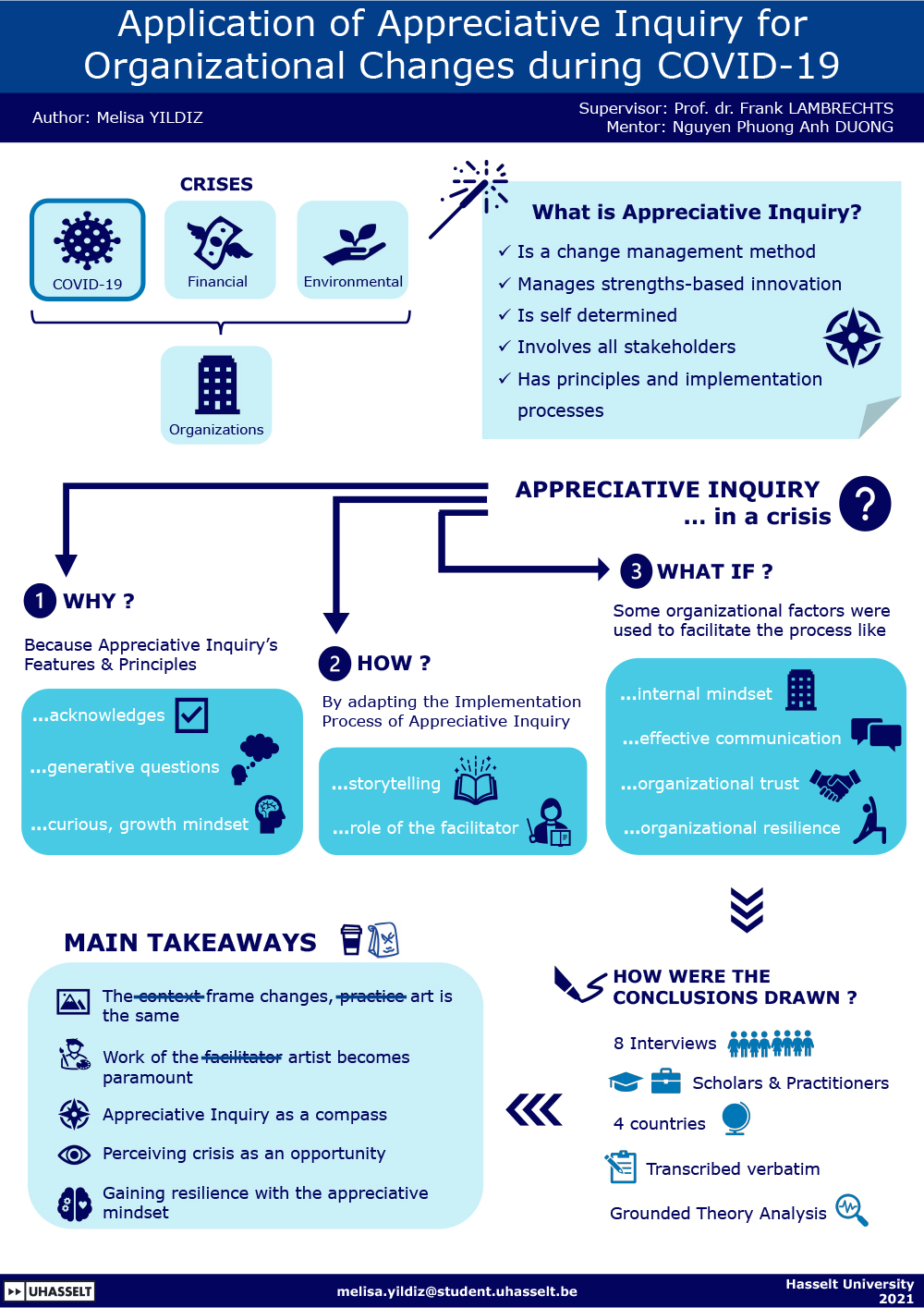
One of the key global topics at this time in human history is about the Covid-19 pandemic that for almost two years has held our attention and challenged us to think differently. It has shifted the narrative from being predominantly focussed on the future to the here-and-now experience of how we are coping as a global community. Melisa Yildiz explains how Appreciative Inquiry can be applied for organisational changes as we figure our way through the pandemic. I am delighted to introduce our voices from the field for this issue of AI Practitioner.

The Covid-19 pandemic has had the world under its influence since early 2020 and forced many organizations to go through transformational changes and adapt to the circumstances that have emerged because of it. It is well established that Appreciative Inquiry (AI) is a successful approach and change management modality for organizational development (OD). With its set of principles and implementation practices, it involves all the stakeholders of an organization, enabling them to self-determine their change and navigate through the change process. However, the literature in this field lacks information explaining whether/how it holds up when applied during a crisis. There is a gap to be filled with the discovery of the answers to the question “How can AI help organizations go through transformational changes during the Covid-19 pandemic?” To approach this gap, this study has examined:
“Which features of AI can be particularly useful in a time of a crisis like the Covid-19 pandemic?”
“How can AI implementation processes (e.g., 4D cycle) be modified to meet the current situation of the world during a crisis such as the Covid-19 pandemic?”
“Are there any organizational factors that can facilitate the implementation of AI during crises such as the Covid-19 pandemic?”
The conclusions were drawn by following a qualitative research methodology and interviewing eight well-respected scholars and practitioners in this field whose work has contributed to organizations and to literature about AI over decades. This was a diverse group with members from four different countries: Canada, United States, South Africa and Belgium, with differences in expertise that brought richness to the findings. No controversial data was arose from the study; all were unanimous in relation to the benefits of using AI for organizational change in times of crisis.
The findings show that when it comes to which features of AI can be of assistance in times like this, the name of the practice speaks for itself: “Appreciation” means to acknowledge the reality and complexity of the world’s situation and in doing so, contrary to what has been assumed in some literature, not labeling experiences as “good” or “bad” by focusing on one side or another. When it comes to “Inquiry”, it is about asking generative questions which invite people to reflect on their experiences. During the current crisis, the questions took a shift because the context required that in order to stay relevant.
To help organizations navigate through the uncertainty of a crisis, AI uses change questions that focus on the smallest incremental changes that are in the circle of influence with the current circumstances. Examples can be “what can we do better this week?” or “what have we achieved since yesterday?” In crises, a big challenge for all organizations is to navigate through the world’s uncertainty.
AI enables that by perceiving crises as an opportunity for development in crisis contexts as much as in more predictable times. So, AI invites us to have a growth and curiosity mindset to perceive successes and failures as learning experiences. Having such a mindset amid uncertainty allows focus on incremental changes that can both influence and control at the same time. Influence and control are empowered by one of the most prominent and distinctive features of AI: strengths-based and generative probing to channel what is powerful within the organization’s context.
Another aspect that the findings shed light on is the more practical side, the implementation process of AI (e.g., 4D cycle). The findings show that the processes of AI don’t need to change, and the models essentially hold. However, regardless of whether it is applied during a crisis or not, the process is always modified based on the context and the needs of the group. Therefore, the goal of all the steps is to include every voice in the system. This makes the entire process meaningful for everyone as the organization becomes infused with innovation that results from the collaboration.
To do that, AI uses interviews and storytelling methods where each participant is asked to share their perspective and bring personal agency. Through these exercises, the organization can undertake a self-discovery of its values and understand the ways in which it can use them to navigate through the crisis. So, it is necessary to make sure that the group spends enough time on this. Therefore, another crucial element is the role of the facilitator, which is to fully acknowledge the impact of the crisis on the group. A pitfall is that some facilitators see the steps of process as linear checkboxes and follow them strictly regardless of the group’s needs. However, especially in crises, the facilitator should be flexible with the process, be able to modify it based on the needs of the group and the context, and overall be ready to diverge with the group. Since the facilitator should try to establish the same quality of relatedness in crises times, the role becomes paramount.
Finally, the last set of findings in this study tackles the question “What if there are some organizational factors that can be used to facilitate the process?” First, the internal mindset of an organization and the leadership’s approach play a crucial role in the effectiveness of the process. An organization first needs to be aware of the mindset it carries, and if it happens that this mindset doesn’t align with what they want to achieve, they need to have the agility to change it.
One other factor that is intrinsically linked with AI is effective communication. For example, the Social Constructionist principle and storytelling exercises in the implementation process help build organizational trust by using the basics of effective communication exercises naturally. Therefore, effective communication is both a part of the process and its outcome, since the process invites the organization to use these practices in the long run afterwards.
Another factor that was found to be correlated with AI is organizational trust. AI uses and engenders high levels of trust during crises by its inclusive nature, beyond hierarchical barriers, which creates a sense of shared meaning. With the support of leadership, as with the other factors, trust is also encouraged during and after the process. The last factor, which has one of the strongest links to AI, is organizational resilience. Everything aforementioned works toward developing resilience because AI leads organizations to perceive crisis as a learning experience and to enhance adaptability with its practices.
A metaphor can summarize the main takeaways: AI is like a piece of art: with a changing context (like the current pandemic crisis) the frame changes. But the artwork inside stays the same. This means that the AI principles, features and processes still hold when applied during a crisis. All that is needed to adapt is to look at all aspects from a context (the frame) to make the practice relevant. For that, the work of the facilitator (the artist) becomes paramount. The results build on existing evidence that AI helps navigate through change and crisis, like a compass pointing at the opportunity masked by the crisis. For all those reasons, AI is an excellent method to consult and even meant for times like this.
The contribution of this study is that it supports the necessary nuances of AI practices to be implemented in times of crisis, which offers highly relevant implications for practice from first-hand experience. There is a consensus that there will be a mix-up of virtual and in-person practices. A further study can examine the reasons for and in which practical ways online and in-person practices can be interlaced.
Intro by Keith Storace



